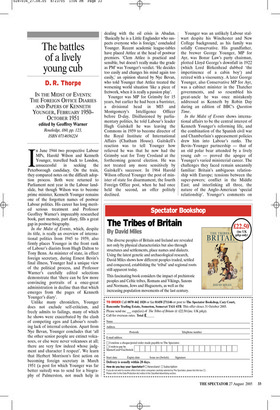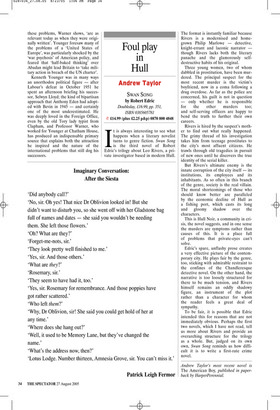The battles of a lively young cub
D. R. Thorpe
IN THE MIDST OF EVENTS: THE FOREIGN OFFICE DIARIES AND PAPERS OF KENNETH YOUNGER, FEBRUARY 1950– OCTOBER 1951 edited by Geoffrey Warner Routledge, £60, pp. 123, ISBN 0714656224 In June 1944 two prospective Labour MPs, Harold Wilson and Kenneth Younger, travelled back to London, unsuccessful in seeking the Peterborough candidacy. On the train, they compared notes on the difficult adoption process. Both were returned to Parliament next year in the Labour landslide, but though Wilson was to become prime minister, Kenneth Younger remains one of the forgotten names of postwar Labour politics. His career has long merited serious treatment and Professor Geoffrey Warner’s impeccably researched book, part memoir, part diary, fills a great gap in postwar biography.
In the Midst of Events, which, despite its title, is really an overview of international politics from 1945 to 1959, also firmly places Younger in the front rank of Labour’s diarists from Hugh Dalton to Tony Benn. As minister of state, in effect foreign secretary, during Ernest Bevin’s final illness, Younger had a unique view of the political process, and Professor Warner’s carefully edited selections demonstrate that ‘there can be few more convincing portraits of a once-great administration in decline than that which emerges from the pages of Kenneth Younger’s diary’.
Unlike many chroniclers, Younger does not exclude self-criticism, and freely admits to failings, many of which he shows were exacerbated by the clash of competing egos and Labour’s resulting lack of internal cohesion. Apart from Nye Bevan, Younger concludes that ‘all the other senior people are extinct volcanoes, or else were never volcanoes at all; there are very few indeed whose judgment and character I respect’. We learn that Herbert Morrison’s first action on becoming foreign secretary in March 1951 (a post for which Younger was far better suited) was to send for a biography of Palmerston, not much help in dealing with the oil crisis in Abadan. ‘Basically he is a Little Englander who suspects everyone who is foreign,’ concluded Younger. Recent academic league-tables have placed Attlee at the head of postwar premiers. ‘Clem Attlee is practical and sensible, but doesn’t really make the grade as PM’ was Younger’s verdict. ‘He decides too easily and changes his mind again too easily,’ an opinion shared by Nye Bevan, who told Younger that Attlee treated the worsening world situation ‘like a piece of fretwork, when it is really a passion play’.
Younger was MP for Grimsby for 15 years, but earlier he had been a barrister, a divisional head in MI5 and Montgomery’s Intelligence Officer before D-day. Disillusioned by parliamentary politics, he told Labour’s leader Hugh Gaitskell he was leaving the Commons in 1959 to become director of the Royal Institute of International Affairs (Chatham House). Gaitskell’s reaction was to tell Younger how relieved he was that he now had the Grimsby seat for Tony Crosland at the forthcoming general election. He was not treated any more sensitively by Gaitskell’s successor. In 1964 Harold Wilson offered Younger the post of minister of state for disarmament, the fourth Foreign Office post, when he had once held the second, an offer politely declined. Younger was an unlikely Labour stalwart despite his Winchester and New College background, as his family was solidly Conservative. His grandfather, the brewer George Younger, MP for Ayr, was Bonar Law’s party chairman, plotted Lloyd George’s downfall in 1922 (which Lord Birkenhead dubbed ‘the impertinence of a cabin boy’) and retired with a viscountcy. A later George Younger, also Conservative MP for Ayr, was a cabinet minister in the Thatcher governments, and so resembled his great-uncle he was once mistakenly addressed as Kenneth by Robin Day during an edition of BBC’s Question Time.
In the Midst of Events shows international affairs to be the central interest of Kenneth Younger’s reforming life, and the combination of the Spanish civil war and Chamberlain’s appeasement policies drew him into Labour’s ranks. The Bevin–Younger partnership — that of an old polar bear attended by a lively young cub — proved the apogee of Younger’s varied ministerial career. The challenges they faced remain uncannily familiar: Britain’s ambiguous relationship with Europe; tensions between the super-powers; conflict in the Middle East; and interlinking all three, the nature of the Anglo-American ‘special relationship’. Younger’s comments on these problems, Warner shows, ‘are as relevant today as when they were originally written’. Younger foresaw many of the problems of a ‘United States of Europe’, was particularly shocked by the ‘war psychosis’ of American policy, and feared that ‘half-baked thinking’ over Abadan might lead Britain to ‘take military action in breach of the UN charter’.
Kenneth Younger was in many ways an unorthodox political figure — after Labour’s defeat in October 1951 he spent an afternoon briefing his successor, Selwyn Lloyd; the kind of bipartisan approach that Anthony Eden had adopted with Bevin in 1945 — and certainly one of the most underestimated. He was deeply loved in the Foreign Office, even by the old Tory lady typist from Clapham, and Professor Warner, who worked for Younger at Chatham House, has produced an indispensable primary source that explains both the attraction he inspired and the nature of the international problems that still dog his successors.












































 Previous page
Previous page